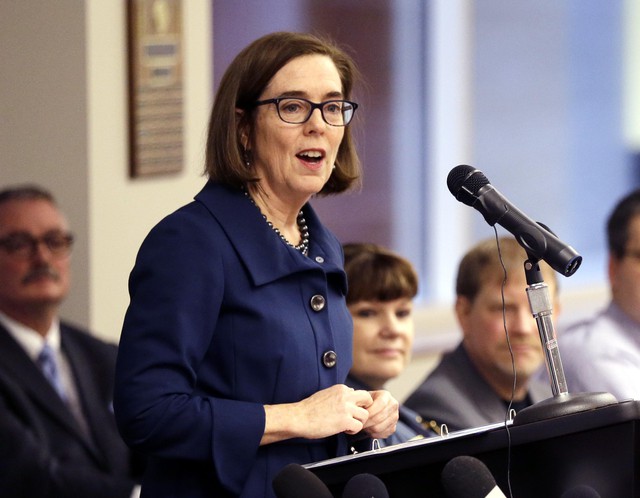
Oregon Governor Will Sign Controversial Tax Bill, Call Special Session
Listen
BY DIRK VANDERHART
Oregon Gov. Kate Brown is ditching part of the federal tax plan after all.
After weeks of speculation on her intentions, Brown announced Friday that she’ll sign Senate Bill 1528, ensuring that Oregon won’t follow the lead of the federal government in granting a tax break to a subset of businesses.
“Without any action on the state level, a third and unnecessary tax break would be inadvertently created,” Brown wrote in a letter to Secretary of State Dennis Richardson announcing her decision. “And that is inherently unfair to all other taxpayers.”
Brown’s decision means that Oregon can count on hundreds of millions of dollars more in revenue than if she’d vetoed the bill — roughly $1.05 billion through 2023. But it’s sure to frustrate business groups and Republicans, who’ve argued the tax breaks were needed for small businesses and urged a veto.
The decision comes with an olive branch, however.
Brown also announced Friday that she’ll convene a special session of the Legislature, her first since taking office in 2015. The goal: to pass a law to extend lower tax rates to a segment of very small businesses known as sole proprietorships.
It’s not the same tax break at issue in SB 1528. Instead, Brown says she wants to make sure these small businesses get a lower tax rate legislators gave other businesses as part of a “grand bargain” in 2013.
“This is what you have to do when tax policy is passed in the dead of night by Congress without one single public hearing,” Brown said in a sit-down with reporters Friday afternoon. “It is fundamentally unfair that we take a hit to the state budget” because of the federal changes, she said.
News of Brown’s decision was applauded by Sen. Mark Hass, D-Beaverton, one of the bill’s chief architects.
“I knew she’d do the right thing,” Hass said. He quoted the state motto: “She flies with her own wings.”
“We did that here,” Hass said. “We’re not going to get caught in the Trump tax agenda.”
Republicans weren’t as pleased: House Minority Leader Mike McLane, R-Powell Butte, accused Brown of playing “political theater” in an election year.
Anthony Smith, the Oregon state director for the National Federation of Independent Business, painted the decision as a $1 billion tax hike on small business.
“The overwhelming feeling today is disappointment,” he said.
How many businesses would get breaks under Brown’s plan — and what kind of hit that would mean for revenues — wasn’t immediately clear. Brown’s chief of staff, Nik Blosser, noted that past analyses for a similar tax break contemplated a roughly $30 million blow to state coffers.
“The devil’s in the details,” Smith said. “Who’s in and who’s out is going to be very important.”
Extending a lower tax rate to sole proprietorships had been included in one version of SB 1528 during the short session of the Legislature that ended in March. Hass said the provision was pulled in the rush to pass a “clean bill” without overly technical provisions.
“We didn’t have time to negotiate like in a regular session,” Hass said. (The Legislature meets for monthslong regular sessions in odd years and weekslong short sessions in even years.)
The complex push and pull that’s occurred over the last month has roots in a quirk of Oregon tax code: When the federal government adopts changes to its tax code, Oregon adopts those changes as well.
So when the federal Tax Cuts and Jobs Act passed at the end of 2017, giving a 20 percent tax exemption to “pass-through” businesses, Oregon’s code automatically included the same exemption. That didn’t sit well with some legislators, who noted those businesses already get a favorable tax rate and that the state faces budget holes in coming years.
Lawmakers crafted SB 1528, which disconnected the 20 percent exemption for pass-through businesses from the state tax code. The bill passed the Oregon House and Senate along party lines.
But since the bill was signed by House Speaker Tina Kotek, D-Portland, on March 6, Brown’s intent had been opaque. The Democratic governor, who’s running for re-election this year, has spent recent weeks meeting with business groups, labor unions and others to solicit the best arguments for and against the bill.
Brown ultimately made a decision to sign a bill in early April, but told OPB she only got buy-in from Kotek and Senate President Peter Courtney, D-Salem, in the last two days.
“The Senate president is very wary of these special sessions,” Brown said. “These are tricky animals.”
The timing of a special session remains up in the air, though the governor said it will take place between May 16 — the day after the state’s primary elections — and the end of June. She acknowledged that convening legislators to enact a relatively small tax tweak was unusual, but said it was necessary to “give certainty” to small businesses.
Asked if the special session was necessary for what Brown has in mind, Hass said: “That’s a really good question. I’m not going to second-guess the governor.”
Copyright 2018 Oregon Public Broadcasting
Related Stories:

Washington, Idaho receive “F” grades for tobacco prevention programs
Food and Drug Administration officials on Friday, Feb. 24, 2023 pledged a reset in the agency’s tobacco program, responding to criticisms that a lack of direction has hampered federal efforts

Paid leave for families in Washington helps some, frustrates others
Five-month-old Hailey plays with a rattle at her parents’ apartment in Moscow, Idaho. Her parents are taking part in Washington state’s new leave program. (Credit: Lauren Paterson / NWPB) Listen

WA Supreme Court upholds capital gains tax just weeks ahead of collection deadline
The Washington Supreme Court has ruled in a 7-2 decision to uphold the constitutionality of the state’s new capital gains tax. The decision filed Friday comes just weeks before taxes are due.















